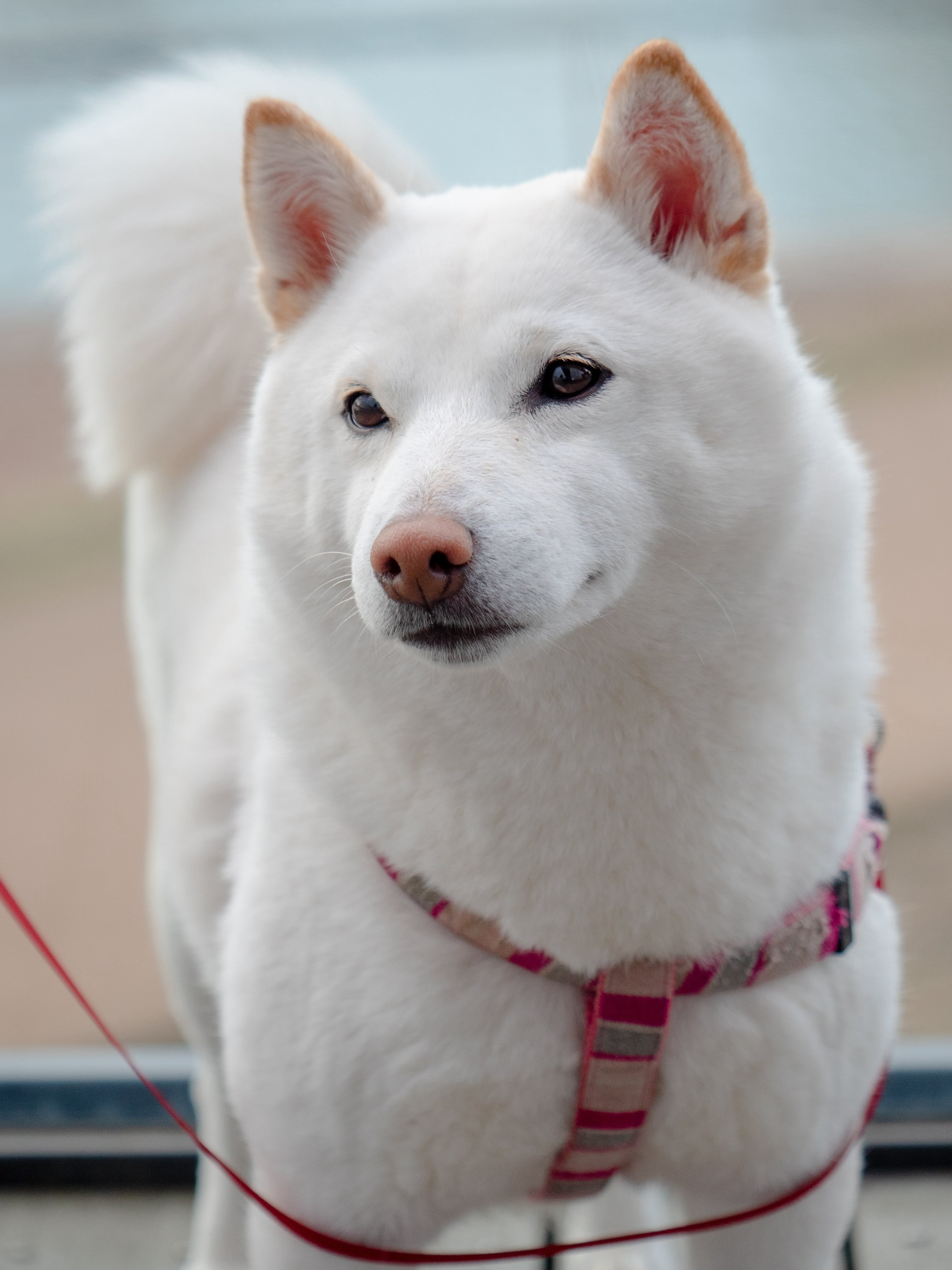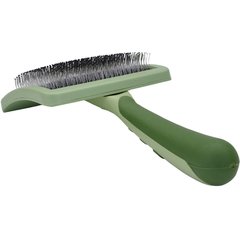Kishu Ken
Adobe Stock/Mountains Hunter
The Kishu Ken is an alert, good-natured hunting dog from Japan’s Kii Peninsula. Often described as being a descendant of the Japanese wolf, the breed certainly looks the part with their short, coarse coat; triangular ears; and sickle-shaped tail.
Despite the Kishu’s rustic appearance, the National Kishu Ken Club (NAKC) describes the breed as being “spirited, affectionate, and focused dogs who have a tendency to ‘wear their heart on their sleeve’ and may have some big opinions they want to share.” And because they were bred to hunt alongside humans, they tend to be very close—but not clingy—with their family.
The Kishu Ken was designated as a national treasure in 1934, and the NAKC notes that the breed was once one of the most common medium-sized dogs in Japan. However, the qualities that set these dogs apart as top wild boar hunters don’t always translate well to modern Japanese apartment life, and the Kishu population has taken a dive in recent years.
Kishu can be “a lot of dog, upfront, for those who are ill prepared or someone meeting the breed for the first time,” according to the NAKC. Because of this, Kishu Ken might not be a good fit for first-time pet parents.
Caring for a Kishu Ken
Kishu Ken are devoted, affectionate, and smart dogs, but their temperament and hunting instincts require careful consideration.
Bred to work, Kishu are active, alert, and need a lot of daily mental stimulation and exercise. In fact, the NAKC says it’s “very unlikely that you will ever be able to provide enough physical exercise to truly wear your Kishu Ken out (but they will thank you for trying).”
Hunters at heart, Kishu Ken may need help learning to pay more attention to you than their own nose and ears when out and about. For this reason, all exercise should be done on a leash or within a securely fenced area so they don’t put themselves in harm’s way.
Bred to work, Kishu are active, alert, and need a lot of daily mental stimulation and exercise.
Though Kishu love their humans, they may have a hard time distinguishing other animals—particularly small ones—from things to chase, thanks to their hunting history and prey drive. Multi-animal households are more likely to succeed if a Kishu Ken puppy grows up alongside the other pets.
Keeping your Kishu groomed won’t demand much of your time and energy, but you should be prepared for regular shedding. The breed also molts twice a year, during which time you’ll need to ramp up your brushing and lint-rolling routine.
Kishu Ken Health Issues
Kishu Ken are generally healthy dogs with a lifespan of 12–15 years. However, like all breeds, they are predisposed to certain health conditions.
Autoimmune Thyroiditis
Autoimmune thyroiditis is a condition in which a dog’s immune system creates inflammation that damages healthy thyroid tissue. It’s the most common cause of hypothyroidism in dogs, meaning the thyroid gland isn’t able to make enough thyroxine, the hormone that controls metabolism.
Signs of autoimmune thyroiditis include:
-
Weight gain
-
Hair loss
-
Dull, dry coat
-
Cold intolerance
-
Skin darkening
-
Recurrent ear and skin infections
Affected dogs are typically given a synthetic hormone for the rest of their lives.
Addison’s Disease
Addison's disease, also called hypoadrenocorticism, is caused by insufficient corticosteroid hormone (stress hormone) production by the adrenal glands. Corticosteroid hormones are vital for stress management, so dogs that lack these can suffer great harm from even small stressors.
The disease is most often detected during routine blood work, but almost a third of dogs are diagnosed after collapsing in shock from an inability to regulate their body’s response to stress. This is called an Addisonian crisis and requires immediate veterinary care.
There isn’t a cure for Addison’s disease, but it can be effectively managed through medication.
Entropion
Entropion is when a dog’s eyelid grows inward, which causes their eyelashes to rub against their cornea (surface of the eye). It’s the most common eyelid abnormality in dogs and can affect the upper lid, lower lid, or both.
Signs of entropion include excessive tears, eye discharge, and red eyes. Your dog may also keep the affected eye closed.
Entropion is painful and requires surgery to fix, but recovery is typically fast and smooth.
Elbow Dysplasia
Elbow dysplasia describes an elbow joint that hasn’t developed as it should, and it’s one of the most common causes of osteoarthritis in dogs’ elbows.
Common signs of elbow dysplasia include:
-
Limping, especially after exercise
-
Reluctance or unwillingness to walk or exercise
-
Stiffness in the elbow joint
-
Grating or crackling sound when elbow joint is moved
Anti-inflammatory drugs can help with the pain and inflammation, but surgery is recommended before osteoarthritis develops.
What To Feed a Kishu Ken

No two Kishu Ken dogs are exactly alike, so it’s important to partner with your veterinarian in choosing the best food and feeding plan for your pet.
Your vet can recommend a food that meets Association of American Feed Control Officials (AAFCO) standards and is nutritionally complete for your pet’s life stage (puppy, adult, or senior), size, lifestyle, and health.
How To Feed a Kishu Ken
Most adult Kishu Ken dogs do well eating two meals a day: once in the morning and again in the evening. Kishu Ken puppies have a higher metabolism and may need three feedings per day (morning, midday, evening).
Your veterinarian can help you create the best feeding schedule for your dog as they age.
How Much Should You Feed a Kishu Ken?
To know how much food to feed your dog, consider your Kishu Ken’s:
-
Weight
-
Age
-
Lifestyle
-
Health
While the dog food packaging provides a rough estimate on feeding portions, the best advice will come from your vet.
Be mindful of how many dog treats you give your Kishu Ken as well. Treats should never make up more than 10% of a dog's daily calories.
Nutritional Tips for Kishu Ken
If your Kishu Ken is eating a complete and balanced dog food that’s AAFCO-compliant, they may not need supplementation.
However, nutritional dog supplements are sometimes used to treat or prevent certain health conditions. For example, your vet may recommend joint supplements if your Kishu is at risk of elbow dysplasia.
Talk to your veterinarian before adding supplements to your dog’s diet.
Behavior and Training Tips for Kishu Ken
Kishu Ken Personality and Temperament
While every dog is an individual with their own personality—breed only makes up about 9% of a dog’s behavior—Kishu Ken typically have a temperament befitting a hunting companion.
The NAKC describes Kishu Ken as bold and dignified but docile in nature (provided you’re not a wild boar, of course). As alert observers, the club says the breed “appears to have the courage and spirit that makes them ready for a challenge.”
That being said, they aren’t all work. Kishu are good-natured and can develop a faithful, affectionate bond with their family. And importantly, they can trade the challenge of boar hunting for challenges like hiking, jogging, and play.
Kishu Ken Behavior
Kishu Ken have strong hunting instincts, which means they can easily follow their senses into trouble and need to be kept either on a leash or within a fenced area when exercising outdoors.
Kishu may also have a difficult time distinguishing fellow pets from prey at home. And while they can do well with older children who know how to properly interact with dogs, Kishu Ken may not be the best playmates for very young children.
Bred to work alongside humans, Kishu Ken living as family pets still need close companionship and daily opportunities to flex and exercise their brain and body. Bored, lonely Kishu Ken with energy to spare will be more likely to engage in unwanted behaviors.
Kishu Ken have strong hunting instincts, which means they can easily follow their senses into trouble and need to be kept either on a leash or within a fenced area when exercising outdoors.
Kishu Ken Training
It’s important to safely expose your Kishu Ken puppy to different animals, people, environments, activities, and objects during their first 16 weeks of life.
This is a crucial learning period for every puppy, and proper socialization can help dogs grow to be well-behaved and comfortable in new situations. A Kishu Ken dog can become reactive and stressed without socialization.
Talk to your Kishu Ken breeder about how they approach socialization, and ask your veterinarian to suggest activities that are safe for your pet’s age.
When it comes to training, the NAKC notes that the breed is easily motivated with positive reinforcement but needs “fast-paced and upbeat training sessions” to hold their interest. Training in this manner also builds the human-animal bond, and provides the Kishu with much-needed mental and physical exercise.
Fun Activities for Kishu Ken
-
Hiking
-
Jogging
-
Skills training
-
Nose work
Kishu Ken Grooming Guide
Kishu Ken have soft, dense undercoats and harsh, straight outer coats that can be white, red, or sesame in color. Though shedding is fairly regular and they lose their undercoats twice a year, daily upkeep is minimal.
Skin Care
Good coat care is foundational to good skin care. If your Kishu spends a lot of time outdoors, check for ticks, twigs, burrs, and other nuisances that can get caught in their fur and irritate their skin.
Bathing frequency will depend in part on your dog’s lifestyle. Keep in mind that too many baths can strip the skin of healthy oils, so ask your veterinarian how often bathing is needed.
Coat Care
Periodic brushing with a rubber or slicker brush can help keep shedding under control, but expect to ramp up your routine during the shedding seasons every spring and fall.
Recommended Products
Eye Care
Kishu Ken can be prone to eye issues, so contact your veterinarian if you notice signs like redness, discharge, or keeping an eye closed.
Ear Care
Talk to your veterinary team about how and how often you should clean your dog’s ears, as well as which ear-cleaning products to use. Call your vet if you notice signs of an ear infection, such as redness, odor, pain, itchiness, or head shaking.
Recommended Products
Considerations for Pet Parents
Here are some questions to consider before adding a Kishu Ken to your family:
-
Do I have time and energy to exercise a dog with exceptional endurance every day?
-
Can I keep a dog either on a leash or within a securely fenced yard when exercising outdoors?
-
Do I live in a home without small animals that could be mistaken for something to chase?
-
Do I have the knowledge and skills to provide a dog with extensive socialization and training?
-
Am I home enough to give a dog close companionship every day?
-
Am I OK with fur on my furniture and clothes?
-
Am I financially prepared to provide veterinary care?
-
Can I provide a dog with a loving home for their lifetime, which could be 15 years or more?
If you can answer these questions with an enthusiastic “Yes!” you may be ready to parent a Kishu Ken.
Kishu Ken FAQs
Are Kishu Ken rare?
Yes, Kishu Ken are an extremely rare dog breed outside of Japan and are becoming increasingly rare in their country of origin.
Do Kishu Ken shed?
Yes, Kishu Ken shed regularly and molt their coats twice a year, in the spring and fall.
How much is a Kishu Ken?
While the price of a Kishu Ken will vary by breeder, you can expect to pay $1,500 or more. The NAKC keeps a list of reputable breeders.
How big do Kishu Ken dogs get?
Kishu Ken are medium-sized dogs that range 30–60 pounds and are 19–22 inches tall.


